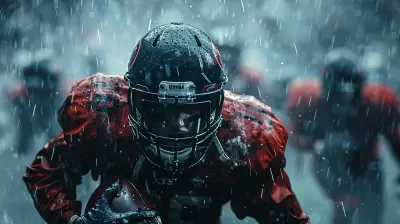Handling Media Relations as a Team Manager
20 August 2025
Being a team manager isn’t just about drawing up schedules or organizing travel—it’s also about being the bridge between the team and the public eye. And we all know, in today’s fast-paced, always-connected world, the media spotlight doesn’t dim for long. Whether it's reporters at the stadium, live post-game interviews, or managing a social media frenzy, handling media relations is a massive part of your job as a team manager.
Let’s be real—media can either be your strongest ally or your biggest headache. How you deal with them not only shapes public perception but can also impact team morale and reputation. So, how do you navigate this high-stakes game? That’s exactly what we’re diving into today.

Why Media Relations Matter More Than Ever
Remember, media isn’t just about newspapers and TV anymore. It’s a 24/7 beast—podcasts, YouTube channels, blogs, tweets, live streams, you name it. One slip, and your team could be trending for all the wrong reasons.Media relations go beyond PR spins. They’re about building healthy, transparent communication between your team and the outside world. As a team manager, you're the quarterback of that play—calling the shots, avoiding fumbles, and making sure the story being told is the right one.
So, let’s break this down and help you become a media-savvy team manager.
1. Understand the Media Landscape
First things first—you can’t play the media game if you don’t know the rules.Traditional Media vs. New Media
Knowing who you're dealing with is half the battle. Traditional media includes newspapers, magazines, radio, and TV. These outlets usually follow stricter journalistic standards and have scheduled deadlines. That means you can plan ahead a bit.Now, enter new media—social media influencers, vloggers, bloggers, and even passionate fans with huge followings. These folks operate in real-time, and their content spreads faster than wildfire. There’s little to no delay, and things often go viral before you even know what hit you.
Build a Media Contact List
Would you go into a match without knowing your opponents? Of course not. The same logic applies here. Make a list of trusted, reliable media contacts. These are the folks you want in your corner when things get hectic. Keep in touch with them, offer exclusives occasionally, and show appreciation. A little relationship-building goes a long way.
2. Craft Consistent and Clear Messaging
If there's one golden rule in media relations, it’s this: Control the narrative before someone else does.Develop Talking Points
Before any media interaction—whether it’s a press conference or a quick sideline interview—make sure you’ve got your key points in mind. These should reflect your team’s values, goals, and culture. Think of them as your GPS; no matter where the conversation goes, your talking points will steer it back on course.Stay Unified
You and your coaching staff, players, PR team—all need to be on the same page. Mixed messages cause confusion, and confusion can quickly turn into controversy. Have regular internal briefings to align everyone.
3. Train Your Players for Media Exposure
Let’s be honest—players are the face of your team. The way they handle interviews reflects directly on you.Media Training is a Must
Set up media training sessions—yes, like actual training drills but for interviews. Teach players how to deal with tricky questions, avoid controversial topics, and stay respectful even under pressure.Encourage Authenticity
You don’t want your players to sound like robots. Encourage them to be genuine, stay humble, and speak from the heart, but with tact and responsibility. Think of it as walking a tightrope—balance is everything.4. Know When (and How) to Speak
Timing, tone, and platform—these three elements can make or break your message.Timing Is Everything
After a tough loss or a heated game, emotions run high. That’s not always the best time for a media session. If needed, delay the interview, cool things down, and regroup. It’s perfectly fine to ask for a few minutes—you’ll thank yourself later.Choose the Right Platform
Sometimes a press release does the job. Other times, a quick video statement on social media is more effective. Choose the medium that best fits your message. For serious or sensitive issues, go traditional. For casual updates or morale boosts, go social.5. Crisis Management: Be Calm, Be Fast, Be Honest
When things go south—and they will at some point—it’s your job to steer the ship through the storm.Don’t Duck the Media
Avoiding the media during a crisis is like ignoring a fire alarm—it only makes things worse. Address the issue quickly, honestly, and with a clear plan of action. Hiding will only fuel rumors and speculation.Control the Narrative
You don't have to give away every detail, but you should provide enough to show accountability and transparency. Own what needs owning, correct misinformation without being defensive, and lay out the steps being taken moving forward.6. Leverage Social Media the Right Way
It’s a double-edged sword, isn’t it? When used wisely, social media can amplify your team’s voice in amazing ways.Build a Positive Online Presence
Work with your social media team to regularly post behind-the-scenes content, community outreach efforts, highlights, and positive updates. This builds goodwill and gives fans a deeper connection with the team.Respond, Don’t React
It’s tempting to clap back at trolls or respond emotionally to criticism—but that rarely ends well. Be thoughtful in your responses, and if needed, take the time to think things through before replying. Silence isn’t weakness; sometimes it’s strategy.7. Establish a Solid PR Strategy
Think of PR as your team’s defensive line. It’s there to protect your players, your reputation, and your brand.Plan Ahead
Pre-season is the perfect time to set up your PR calendar. Schedule announcements, player features, community events, and media days. Having a roadmap keeps things smooth and avoids last-minute chaos.Have a Crisis Plan
Not to sound dramatic, but you should treat crisis communication like a fire drill. Know who's handling what, who’s the spokesperson, and what the chain of command looks like. The clearer this is, the faster and better you'll be able to respond.8. Build Trust with Journalists
Remember, not all media folks are out to get you. Many just want a good story—and if you’re honest, respectful, and consistent, they’ll come to you first.Be Accessible
Make it easy for journalists to reach you or your PR team. Avoid leaving them hanging or being hard to find—that only breeds frustration and, worse, assumptions.Provide Value
Instead of always being on the defensive, offer positive stories too—highlight players doing volunteer work, share unique training methods, or showcase the team’s involvement in local causes. These human-interest angles can score major goodwill.9. Protect Your Team’s Privacy
Yes, the public craves access, but that doesn’t mean every detail should be out there.Set Boundaries
Make it clear what’s off-limits—locker room access, family matters, internal decisions—protect that like a goalie guards the net. Respecting privacy not only builds internal trust but prevents unnecessary drama.Use NDAs and Media Policies
It might sound formal, but having players and staff sign media policy agreements ensures everyone knows the dos and don'ts. It’s a small step that can prevent big headaches down the line.10. Always Listen Before You Speak
This might be the simplest yet most overlooked piece of advice.Understand the Question
In interviews, don’t jump to answer. Really listen. What are they really asking? What’s behind the question? This not only helps you respond wisely but also shows maturity and control.Feedback Loop
After media events, do a debrief. What went well? Any red flags? What can be done better next time? Media relations, like any skill, gets better with practice and reflection.Wrapping It All Up
Handling media relations as a team manager isn't just about damage control—it's about storytelling, trust-building, and managing perception like a pro. Sure, it can be tricky. But with the right mindset, preparation, and game plan, you can master it.At the end of the day, think of media as your loudspeaker. When handled right, it can echo your team's values, victories, and vision far and wide. So, suit up, stay sharp, and keep the conversation going—your team’s reputation depends on it.
all images in this post were generated using AI tools
Category:
Team ManagementAuthor:

Everett Davis
Discussion
rate this article
1 comments
Andrea Kane
Great insights on managing team media relations!
September 4, 2025 at 12:52 PM

Everett Davis
Thank you! I’m glad you found the insights helpful!


